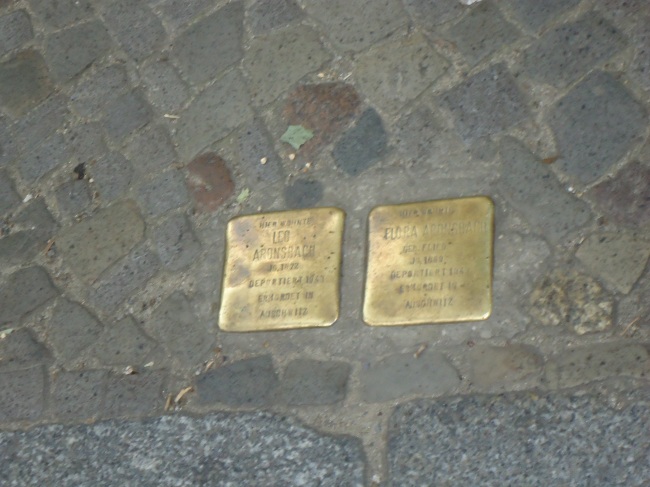Today was probably one of the most interesting days along the lines of discussion. We started out at the Forum for Dialogues Among Nations to discuss how Poland is combating anti-Semitism. The Forum does days-long youth programs in schools that are interactive and help the kids learn about the Jewish history of the town. A lot of Jewish history has been obliterated and many people don’t realize that they live where Jews once lived.
The conversation got really interesting when stumbling stones were brought up as a form of remembrance. Stumbling stones are prominent in Germany and many countries in Europe – they are small bronze squares in front of homes and former workplaces of victims of the Holocaust. They say the name, date of birth, date of deportation, and date and location of death of a certain person. It is meant for people to literally stumble over the stone and think about the victims that lived in their area.
One of the students on the dialogue asked the woman leading the discussion why Poland does not wish to have stumbling stones – they rejected the idea a couple of years ago. The lady quickly got almost defensive about it and said that no victim should receive special treatment over another – that if Poland was going to have one stumbling stone, they needed to have at least 3.5 million, for every Jew that was killed in Poland, not to mention the other 3 million Poles of non-Jewish descent who also perished. She also said that no one wanted to know that they lived in a house where someone was made a victim; no one wanted to know that Jews had lived in their house. I found this mildly contradictory to what she was speaking about, but I think it was more of a moment of passion than anything else.
She also noted that Poland isn’t really fighting against anti-Semitism, but rather it is an anti-anti-Semitic culture.
One of the biggest things I took away from this conversation was that while Germany lives with the Holocaust today through narratives of guilt, Poland has a culture of victimhood – Hitler was very adamant about completely wiping out the country in order for the Aryans to have more living space. While this is completely justified, Poles are almost sensitive about how their past is represented: even though many death camps, including Auschwitz, was in Poland, all the massacres had been performed by Nazi Germany, not by the Poles.
Another interesting note from this discussion was the realization that Poland never had a chance to deal with remembrance of the Holocaust until the end of Soviet occupation. Communism had led to a culture of silence in the country.
After this discussion we went to the U.S. Embassy to have a discussion with J.P. Schutte, one of the employees there. We talked a lot about Jewish-Polish relations, WWII heroes, and anti-Semitism in Poland today. It isn’t commonly blatant because anti-Semitism is seriously looked down upon, but there are two significant cases to study. Firstly, very few Jews were able to get there land back after WWII. They had to go to court to reclaim the land, and fees, length, and other issues led to very little land ever being returned. Court hearing still occur today to hash out whether or not the descendants of these people can rightfully get the land back.
The second case is one involving PETA – they are fighting for a ban on kosher meat in Poland because of how the animals are slaughtered. It isn’t outwardly anti-Semitic, but its cases like these that highlight how Jews are still discriminated against in the country.
All in all, an incredibly interesting day.
